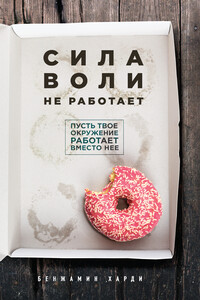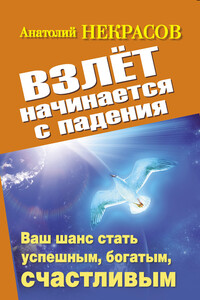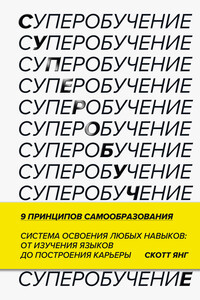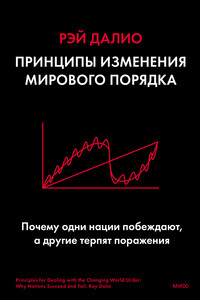В минусе или в плюсе. Руководство по достижению счастья, уверенности в себе и успеха [заметки]
1
Здесь и далее таким образом оформлены цитаты Дэна Салливана.
2
Jefferson, T. (1763). From Thomas Jefferson to John Page, 15 July, 1763. Founders Archives. https://founders.archives.gov/documents/Jefferson/01-01-02-0004.
3
National Science Foundation. (2020). COVID Response Tracking Study. University of Chicago. Retrieved on March 27, 2021, at https://www.norc.org/Research/Projects/Pages/covid-response-tracking-study.aspx.
4
Erez, M., Earley, P. C. (1993). Culture, self-identity, and work. Oxford University Press on Demand.
5
Barnard, J. W. (2008). Narcissism, over-optimism, fear, anger, and depression: The interior lives of corporate leaders. University of Cincinnati Law Review, 77, 405.
6
Cubbon, L., Darga, K., Wisnesky, U. D., Dennett, L., Guptill, C. (2020). Depression among entrepreneurs: A scoping review. Small Business Economics, 1–25.
7
McKeown, G. (2021). Effortless: Make it easier to do what matters most. Currency.
8
Sheldon, K. M., Lyubomirsky, S. (2012). The challenge of staying happier: Testing the hedonic adaptation prevention model. Personality and Social Psychology Bulletin, 38(5), 670–680.
9
Lyubomirsky, S. (2011). Hedonic adaptation to positive and negative experiences. Oxford University Press.
10
Eysenck, M. W. (1994). Happiness: Facts and myths. Psychology Press.
11
Grover, T. (2021). Winning: The unforgiving race to greatness (Tim Grover Winning Series). Scribner.
12
Sullivan, D. (2019). Always be the buyer: Attracting other people’s highest commitment to your biggest and best standards. The Strategic Coach Inc.
13
Godin, S. (2015). Poke the box: When was the last time you did something for the first time? Penguin.
14
Godin, S. (2012). The Icarus deception: how high will you fly? Penguin.
15
Campbell, J. (2008). The hero with a thousand faces (The collected works of Joseph Campbell). New World Library.
16
Издана на русском языке: Салливан Д., Харди Б. Кто, а не как. Выбирай коллаборацию вместо конкуренции. М.: Издательская студия «Поле», 2021. Прим. ред.
17
PhD (doctor of philosophy) – в США последняя, высшая, ступень академического образования; примерно соответствует российской научной степени «кандидат наук». Прим. ред.
18
Jansen, D. (2020). Dr. Jim Loehr on mental toughness, energy management, the power of journaling, and Olympic gold medals (#490). The Tim Ferriss Show. Retrieved March 2, 2021, at https://tim.blog/2020/12/28/jim-loehr-2/.
19
Walsh, L. C., Boehm, J. K., Lyubomirsky, S. (2018). Does happiness promote career success? Revisiting the evidence. Journal of Career Assessment, 26(2), 199–219.
20
Fredrickson, B. L. (2004). The broaden-and-build theory of positive emotions. Philosophical Transactions of the Royal Society of London, Series B: Biological Sciences, 359(1449), 1367–1377.
21
Park, G. (2021). The benefit of gratitude: trait gratitude is associated with effective economic decision-making in the ultimatum game. Frontiers in Psychology, 12, 590132.
22
Sitzmann, T., Yeo, G. (2013). A meta-analytic investigation of the within-person self-efficacy domain: Is self-efficacy a product of past performance or a driver of future performance? Personnel Psychology, 66(3), 531–568.
23
Ravikant, N. (2016). Naval Ravikant on happiness hacks and the 5 chimps theory (#136). The Tim Ferriss Show. Retrieved on March 29, 2021, at https://tim.blog/naval-ravikant-on-the-tim-ferriss-show-transcript/.
24
Rollings, M. (2014). The difference between wanting someone and needing them. Thought Catalog. Retrieved on May 22, 2021, at https://thoughtcatalog.com/michaela-rollings/2014/05/the-difference-between-wanting-someone-and-needing-them/.
25
Undisputed. (2021). Shannon reacts to Trevor Lawrencero response to perceived lack of motivation | NFL | UNDISPUTED. FOX SPORTS. Retrieved on July 8, 2021, at https://www.youtube.com/watch?v=MdBIR-NbAjc&t=22s.
26
Lawrence, T. (2021). Twitter response to media about his Sports Illustrated comments. Retrieved on May 22, 2021, at https://twitter.com/Trevorlawrencee/status/1383467135410655235.
27
Lawrence, T. (2021). Stephen A.m/Trevorlawrencee/status Trevor Lawrence before the 2021 NFL Draft | First Take. YouTube: ESPN channel. Retrieved on May 22, 2021, at https://www.youtube.com/watch?v=CjKBGp9Zrko&t=49s.
28
Vallerand, R. J., Salvy, S. J., Mageau, G. A., Elliot, A. J., Denis, P. L., Grouzet, F. M., Blanchard, C. (2007). On the role of passion in performance. Journal of Personality, 75(3), 505–534.
29
Bonneville-Roussy, A., Lavigne, G. L., Vallerand, R. J. (2011). When passion leads to excellence: The case of musicians. Psychology of Music, 39(1), 123–138.
30
Vallerand, R. J. (2010). On passion for life activities: The dualistic model of passion. In Advances in experimental social psychology (Vol. 42, pp. 97–193). Academic Press.
31
St-Louis, A. C., Verner-Filion, J., Bergeron, C. M., Vallerand, R. J. (2018). Passion and mindfulness: Accessing adaptive self-processes. The Journal of Positive Psychology, 13(2), 155–164.
32
Amemiya, R., Sakairi, Y. (2019). The effects of passion and mindfulness on the intrinsic motivation of Japanese athletes. Personality and Individual Differences, 142, 132–138.
33
Carpentier, J., Mageau, G. A., Vallerand, R. J. (2012). Ruminations and flow: Why do people with a more harmonious passion experience higher well-being? Journal of Happiness Studies, 13(3), 501–518.
34
Stenseng, F., Dalskau, L. H. (2010). Passion, self-esteem, and the role of comparative performance evaluation. Journal of Sport and Exercise Psychology, 32(6), 881–894.
35
Carpentier, J., Mageau, G. A., Vallerand, R. J. (2012). Ruminations and flow: Why do people with a more harmonious passion experience higher well-being? Journal of Happiness Studies, 13(3), 501–518.
36
Rheinberg, F., Engeser, S. (2018). Intrinsic motivation and flow. In Motivation and Action (pp. 579–622). Springer.
37
Keller, J., Bless, H. (2008). Flow and regulatory compatibility: An experimental approach to the flow model of intrinsic motivation. Personality and Social Psychology Bulletin, 34(2), 196–209.
38
Seifert, T., Hedderson, C. (2010). Intrinsic motivation and flow in skateboarding: An ethnographic study. Journal of Happiness Studies, 11(3), 277–292.
39
Duckworth, A. L., Peterson, C., Matthews, M. D., Kelly, D. R. (2007). Grit: Perseverance and passion for long-term goals. Journal of Personality and Social Psychology, 92(6), 1087.
40
Verner-Filion, J., Schellenberg, B. J., Holding, A. C., Koestner, R. (2020). Passion and grit in the pursuit of long-term personal goals in college students. Learning and Individual Differences, 83, 101939.
41
Zhao, Y., Niu, G., Hou, H., Zeng, G., Xu, L., Peng, K., Yu, F. (2018). From growth mindset to grit in Chinese schools: The mediating roles of learning motivations. Frontiers in Psychology, 9, 2007.
42
Shinn, F. S. (2012). The new game of life and how to play it. Simon and Schuster.
43
Фромм Э. Бегство от свободы. М.: АСТ, 2021. Прим. ред.
44
Fromm, E. (1994). Escape from freedom. Macmillan.
45
Bay, C. (1970). The structure of freedom. Stanford University Press.
46
Veenhoven, R. (2000). Freedom and happiness: A comparative study in forty-four nations in the early 1990s. In Culture and subjective well-being, (pp. 257–288). MIT Press.
47
Okulicz-Kozaryn, A. (2014). «Freedom from» and «freedom to» across countries. Social Indicators Research, 118(3), 1009–1029.
48
Maslow, A. H. (1943). A theory of human motivation. Psychological Review, 50(4), 370.
49
Godin, S. (2012). Stop stealing dreams (What is school for?). Seth Godin.
50
Robinson, K., Lee, J. R. (2011). Out of our minds. Tantor Media, Inc.
51
Robinson, K. (2006). Do schools kill creativity? TED Talk.
52
Zalta, E. N., Nodelman, U., Allen, C., Anderson, R. L. (2005). Stanford encyclopedia of philosophy. Palo Alto CA: Stanford University.
53
Ryan, R. M., Deci, E. L. (2019). Brick by brick: The origins, development, and future of self-determination theory. In Advances in motivation science (Vol. 6, p. 111–156). Elsevier.
54
Fogg, B. J. (2009). Creating persuasive technologies: an eight-step design process. In Proceedings of the 4th international conference on persuasive technology (paper 44).
55
Al-Menayes, J. (2016). The fear of missing out scale: Validation of the Arabic version and correlation with social media addiction. International Journal of Applied Psychology, 6(2), 41–46.
56
Rhodes, L., Orlowski, J. (2020). The social dilemma. Netflix Original Documentary.
57
Ziglar, Z. (2015). Master successful personal habits: success legacy library. Gildan Media.
58
Jan, M., Soomro, S., Ahmad, N. (2017). Impact of social media on self-esteem. European Scientific Journal, 13(23), 329–341.
59
Vogel, E. A., Rose, J. P., Roberts, L. R., Eckles, K. (2014). Social comparison, social media, and self-esteem. Psychology of Popular Media Culture, 3(4), 206.
60
Lin, L. Y., Sidani, J. E., Shensa, A., Radovic, A., Miller, E., Colditz, J. B., Hoffman, B. L., Giles, L. M., Primack, B. A. (2016). Association between social media use and depression among US young adults. Depression and Anxiety, 33(4), 323–331.
61
Kim, M. H., Min, S., Ahn, J. S., An, C., Lee, J. (2019). Association between high adolescent smartphone use and academic impairment, conflicts with family members or friends, and suicide attempts. PloS One, 14(7), e0219831.
62
McCoy, S. (2020). How to measure success. @Vsg_queendiet.
63
Baer, D. (2013). How Arianna Huffington networks without networking. Fast Company. Retrieved on June 3, 2021, at https://www.fastcompany.com/3018307/how-arianna-huffington-networks-without-networking.
64
Jackson, D. (1999). I know I’m being successful when. I Love Marketing. Retrieved on April 15, 2021, at https://ilovemarketing.com/i-know-im-being-successful-when/.
65
Gilbert, D. (2014). The psychology of your future self. TED talk.
66
Seneca, L. A. (2004). On the shortness of life (Vol. 1 of Penguin Great Idea series). Penguin UK.
67
Sivers, D. (2009). No yes. Either HELL YEAH! or no. Retrieved on June 3, 2021, at https://sive.rs/hellyeah.
68
Carey, N. (2012). The epigenetics revolution: How modern biology is rewriting our understanding of genetics, disease, and inheritance. Columbia University Press.
69
Epel, E. S., Lithgow, G. J. (2014). Stress biology and aging mechanisms: Toward understanding the deep connection between adaptation to stress and longevity. Journals of Gerontology Series A: Biomedical Sciences and Medical Sciences, 69(Suppl. 1), S10–S16.
70
Seligman, M. E. (2004). Authentic happiness: Using the new positive psychology to realize your potential for lasting fulfillment. Simon and Schuster.
71
Danner, D. D., Snowdon, D. A., Friesen, W. V. (2001). Positive emotions inearly life and longevity: Findings from the nun study. Journal of Personality and Social Psychology, 80(5), 804–813.
72
Gallup-Healthways Well-Being Index (2008). As referenced in: Associated Press. (June 18, 2008). Poll: Unhappy workers take more sick days.
73
Cohen, S., Doyle, W. J., Turner, R. B., Alper, C. M., Skoner, D. P. (2003). Emotional style and susceptibility to the common cold. Psychosomatic Medicine, 65(4), 652–657.
74
Bhadra, U. (2017). The human perception, cognition, and related epigenetics. Gerontology & Geriatrics: Research, 3(1), 1030.
75
Park, C. L., Helgeson, V. S. (2006). Introduction to the special section: Growth following highly stressful life events – current status and future directions. Journal of Consulting and Clinical Psychology, 74, 791–796.
76
Moskalev, A., Aliper, A., Smit-McBride, Z., Buzdin, A., Zhavoronkov, A. (2014). Genetics and epigenetics of aging and longevity. Cell Cycle, 13(7), 1063–1077.
77
Crum, A. J., Langer, E. J. (2007). Mind-set matters: Exercise and the placebo effect. Psychological Science, 18(2), 165–171.
78
Crum, A. J., Corbin, W. R., Brownell, K. D., Salovey, P. (2011). Mind over milkshakes: Mindsets, not just nutrients, determine ghrelin response. Health Psychology, 30(4), 424.
79
Baynes, K. C., Dhillo, W. S., Bloom, S. R. (2006). Regulation of food intake by gastrointestinal hormones. Current Opinion in Gastroenterology, 22(6), 626–631.
80
Yamagishi, T., Horita, Y., Mifune, N., Hashimoto, H., Li, Y., Shinada, M., Miura, A., Inukai, K., Takagishi, H., Simunovic, D. (2012). Rejection of unfair offers in the ultimatum game is no evidence of strong reciprocity. Proceedings of the National Academy of Sciences, 109(50), 20364–20368.
81
Pillutla, M. M., Murnighan, J. K. (1996). Unfairness, anger, and spite: Emotional rejections of ultimatum offers. Organiza-tional Behavior and Human Decision Processes, 68(3), 208–224.
82
Sanfey, A. G., Rilling, J. K., Aronson, J. A., Nystrom, L. E., Cohen, J. D. (2003). The neural basis of economic decision-making in the ultimatum game. Science, 300, 1755–1758.
83
Tabibnia, G., Satpute, A. B., Lieberman, M. D. (2008). The sunny side of fairness: Preference for fairness activates reward circuitry (and disregarding unfairness activates self-control circuitry). Psychological Science, 19(4), 339–347.
84
Robson, S. E., Repetto, L., Gountouna, V. E., Nicodemus, K. K. (2020). A review of neuroeconomic gameplay in psychiatric disorders. Molecular psychiatry, 25(1), 67–81.
85
Kaltwasser, L., Hildebrandt, A., Wilhelm, O., Sommer, W. (2016). Behavioral and neuronal determinants of negative reciprocity in the ultimatum game. Social Cognitive and Affective Neuroscience, 11(10), 1608–1617.
86
Park, G. (2021). The benefit of gratitude: Trait gratitude is associated with effective economic decision-making in the ultimatum game. Frontiers in Psychology, 12, 590132.
87
Koo, M., Algoe, S. B., Wilson, T. D., Gilbert, D. T. (2008). It’s a wonderful life: Mentally subtracting positive events improves people’s affective states, contrary to their affective forecasts. Journal of Personality and Social Psychology, 95(5), 1217.
88
Capra, F., Stewart, J., & Liberty Films. (1946). It’s a wonderful life. Liberty Films.
89
Koo, M., Algoe, S. B., Wilson, T. D., Gilbert, D. T. (2008). It’s a wonderful life: Mentally subtracting positive events improves people’s affective states, contrary to their affective forecasts. Journal of Personality and Social Psychology, 95(5), 1217.
90
Ang, S. H., Lim, E. A. C., Leong, S. M., Chen, Z. (2015). In pursuit of happiness: Effects of mental subtraction and alternative comparison. Social Indicators Research, 122(1), 87–103.
91
Park, A., Raposo, S., Muise, A. (2020). Does imagining you never met a romantic partner boost relationship satisfaction and gratitude? A conceptual replication and extension of the effect of mentally subtracting a partner. Journal of Social and Personal Relationships, 0265407520969871.
92
Pausch, R. (2008). The last lecture. Hachette Books.
93
Gollwitzer, P. M., Sheeran, P. (2006). Implementation intentions and goal achievement: A meta‐analysis of effects and processes. Advances in Experimental Social Psychology, 38, 69–119.
94
van Koningsbruggen, G. M., Stroebe, W., Papies, E. K., Aarts, H. (2011). Implementation intentions as goal primes: Boosting self‐control in tempting environments. European Journal of Social Psychology, 41(5), 551–557.
95
Pignatiello, G. A., Martin, R. J., Hickman, Jr., R. L. (2020). Decision fatigue: A conceptual analysis. Journal of Health Psychology, 25(1), 123–135.
96
Fogg, B. J. (2020). Tiny habits: The small changes that change everything. Houghton Mifflin Harcourt.
97
Jobs, S. (2005). Steve Jobs’ commencement address on June 12, 2005. Stanford University. Retrieved on May 27, 2021, at https://news.stanford.edu/2005/06/14/jobs-061505/.
98
Snyder, C. R., Rand, K. L., Sigmon, D. R. (2002). Hope theory: A member of the positive psychology family. In Handbook of positive psychology, (p. 257–276). Oxford University Press.
99
Williams, J., Dikes, C. (2015). The implications of demographic variables as related to burnout among a sample of special education teachers. Education, 135(3), 337–345.
100
Plash, S., Piotrowski, C. (2006). Retention issues: A study of Alabama special education teachers. Education, 127(1), 125–128.
101
Mitchell, A., Arnold, M. (2004). Behavior management skills as predictors of retention among South Texas special educators. Journal of Instruction Psychology, 31(3), 214–219.
102
Hale-Jinks, C., Knopf, H., Kemple, K. (2006). Tackling teacher turnover in childcare: Understanding causes and consequences, identifying solutions. Childhood Education, 82(4), 219–226.
103
Mack, A. (2003). Inattentional blindness: Looking without seeing. Current Directions in Psychological Science, 12(5), 180–184.
104
Gilbert, D. (2014). The psychology of your future self. TED Talk.
105
Moors, A., De Houwer, J. (2006). Automaticity: A theoretical and conceptual analysis. Psychological Bulletin, 132(2), 297.
106
Howell, W. S. (1982). Conscious and competence: The empathic communicator. University of Minnesota.
107
Getha-Taylor, H., Hummert, R., Nalbandian, J., Silvia, C. (2013). Competency model design and assessment: Findings and future directions. Journal of Public Affairs Education, 19(1), 141–171.
108
Flower, J. (1999). In the mush. Physician Executive, 25(1), 64–66.
109
Slife, B. D. (1993). Time and Psychological Explanation: The Spectacle of Spain’s Tourist Boom and the Reinvention of Difference. SUNY Press.
110
McDonald, H. E., Hirt, E. R. (1997). When expectancy meets desire: Motivational effects in reconstructive memory. Journal of Personality and Social Psychology, 72(1), 5.
111
Patihis, L., Frenda, S. J., LePort, A. K., Petersen, N., Nichols, R. M., Stark, C. E., McGaugh, J. L., Loftus, E. F. (2013). False memories in highly superior autobiographical memory individuals. Proceedings of the National Academy of Sciences, 110(52), 20947–20952.
112
Salvaggio, M. (2018). The justification of reconstructive and reproductive memory beliefs. Philosophical Studies, 175(3), 649–663.
113
Gilbert, D. (2014). The psychology of your future self. TED Talk.
114
Quoidbach, J., Gilbert, D. T., Wilson, T. D. (2013). The end of history illusion. Science, 339(6115), 96–98.
115
Харди Б. Гибкая личность. Как избавиться от ограничивающих убеждений и изменить свое будущее. М.: Манн, Иванов и Фербер, 2021. Прим. ред.
116
Вайцкин Дж. Искусство учиться. Как стать лучшим в любом деле. М.: Манн, Иванов и Фербер, 2014. Прим. ред.
117
Waitzkin, J. (2007). The art of learning: A journey in the pursuit of excellence. Simon and Schuster.
118
Grant, A. (2021). Think again: The power of knowing what you don’t know. Penguin.
119
Grant, A. (2020). Taken for granted: Daniel Kahneman doesn’t trust your intuition. WorkLife with Adam Grant. Apple Podcasts. Retrieved on May 27, 2021, at https://podcasts.apple.com/us/podcast/taken-for-granted-daniel-kahneman-doesnt-trust-your/id1346314086?i=1000513174086.
120
Канеман Д. Думай медленно… решай быстро. М.: АСТ, 2021. Прим. ред.
121
Kahneman, D. (2011). Thinking, fast and slow. Macmillan.
122
Holz, J., Piosczyk, H., Landmann, N., Feige, B., Spiegelhalder, K., Riemann, D., Nissen, C., Voderholzer, U. (2012). The timing of learning before night-time sleep differentially affects declarative and procedural long-term memory consolidation in adolescents. PLoS One, 7(7), e40963.
123
Bunyalug, M., Kanchanakhan, N. (2017). Effect of using smartphone before bed on sleep quality among undergraduate students at cChulalongkorn University, Thailand. Journal of Health Research, 31(Suppl. 2), S225–S231.
124
Deloitte. (2017). 2017 Global Mobile Consumer Survey: US edition: The dawn of the next era in mobile. Retrieved on May 28, 2021, at https://www2.deloitte.com/content/dam/Deloitte/us/Documents/technology-media-telecommunications/us-tmt-2017-global-mobile-consumer-survey-executive-summary.pdf.
125
Randjelović, P., Stojiljković, N., Radulović, N., Ilić, I., Stojanović, N., Ilić, S. (2019). The association of smartphone usage with subjective sleep quality and daytime sleepiness among medical students. Biological Rhythm Research, 50(6), 857–865.
126
Min, J. K., Doryab, A., Wiese, J., Amini, S., Zimmerman, J., Hong, J. I. (2014, April). Toss’n’turn: Smartphone as sleep and sleep quality detector. In Proceedings of the SIGCHI conference on human factors in computing systems (p. 477–486).
127
Bunyalug, M., Kanchanakhan, N. (2017). Effect of using smartphone before bed on sleep quality among undergraduate students at Chulalongkorn University, Thailand. Journal of Health Research, 31(Suppl. 2), S225–S231.
128
Zhang, M. X., Wu, A. M. (2020). Effects of smartphone addiction on sleep quality among Chinese university students: The mediating role of self-regulation and bedtime procrastination. Addictive Behaviors, 111, 106552.
129
McAdams, D. P., McLean, K. C. (2013). Narrative identity. Current Directions in Psychological Science, 22(3), 233–238.
130
Hardy, B. (2020). Take ownership of your future self. Harvard Business Review. Retrieved on May 27, 2021, at https://hbr.org/2020/08/take-ownership-of-your-future-self.
131
Bodner, R., Prelec, D. (2003). Self-signaling and diagnostic utility in everyday decision making. The Psychology of Economic Decisions, 1(105), 26.
132
Ferriss, T. (2019). Josh Waitzkin on how to structure your day for peak performance. The Tim Ferriss Show. YouTube: Tim Ferriss. Retrieved on May 27, 2021, at https://www.youtube.com/watch?v=FEOjCUkjG0k.
133
Ritter, S. M., Strick, M., Bos, M. W., Van Baaren, R. B., Dijksterhuis, A. P. (2012). Good morning creativity: Task reactivation during sleep enhances beneficial effect of sleep on creative performance. Journal of Sleep Research, 21(6), 643–647.
134
Shannon, B. J., Dosenbach, R. A., Su, Y., Vlassenko, A. G., Larson-Prior, L. J., Nolan, T. S., Snyder, A. Z., Raichle, M. E. (2013). Morning-evening variation in human brain metabolism and memory circuits. Journal of Neurophysiology, 109(5), 1444–1456.
135
Cameron, J. (2016). The artist’s way: A spiritual path to higher creativity. Penguin.
136
Cai, D. J., Mednick, S. A., Harrison, E. M., Kanady, J. C., Mednick, S. C. (2009). REM, not incubation, improves creativity by priming associative networks. Proceedings of the National Academy of Sciences, 106(25), 10130–10134.
137
Rohn, J. (1994). The art of exceptional living. Nightingale-Conant / Simon & Schuster Audio.
138
Seligman, M. E., Steen, T. A., Park, N., Peterson, C. (2005). Positive psychology progress: Empirical validation of interventions. American Psychologist, 60(5), 410.
139
Wood, A. M., Joseph, S., Lloyd, J., Atkins, S. (2009). Gratitude influences sleep through the mechanism of pre-sleep cognitions. Journal of Psychosomatic Research, 66(1), 43–48.
140
Jackowska, M., Brown, J., Ronaldson, A., Steptoe, A. (2016). The impact of a brief gratitude intervention on subjective well-being, biology and sleep. Journal of Health Psychology, 21(10), 2207–2217.
141
Sitzmann, T., Yeo, G. (2013). A meta‐analytic investigation of the within‐person self‐efficacy domain: Is self‐efficacy a product of past performance or a driver of future performance? Personnel Psychology, 66(3), 531–568.
142
Фогг Б. Нанопривычки. Маленькие шаги, которые приведут к большим переменам. М.: Бомбора, 2020. Прим. ред.
143
Fogg, B. J. (2020). Tiny habits: The small changes that change everything. Houghton Mifflin Harcourt.
144
Koch, R. (2011). The 80/20 principle: The secret of achieving more with less: Updated 20th anniversary edition of the productivity and business classic. Hachette UK.
145
Koch, R. (2005). The 80/20 individual: How to build on the 20 % of what you do best. Currency.
146
Collins, J. (2001). Good to great: Why some companies make the leap and others don’t. HarperBusiness.
147
Sullivan, D. (2013). How to build confidence every day. YouTube: Strategic Coach. Retrieved on May 27, 2021, at https://www.youtube.com/watch?v=T4XWv-gP6dE&t=9s.
148
Muire, M. (2020). Alarming habits: We surveyed 2,000 Americans to examine some of their habits when it comes to alarms and waking up in the morning. OnePoll study with Mattress Nerd. Retrieved on May 29, 2021, at https://www.mattressnerd.com/alarming-habits/.
149
Fogg, B. J. (2020). Tiny habits: The small changes that change everything. Houghton Mifflin Harcourt.
150
Fogg, B. J. (2019). Fogg’s behavior model. Behavior Design Lab, Stanford University. Stanford, CA, USA, Tech. Rep. BehavioralModel.org.
151
Ross, L., Nisbett, R. E. (2011). The person and the situation: Perspectives of social psychology. Pinter & Martin Publishers.
152
Pignatiello, G. A., Martin, R. J., Hickman, Jr., R. L. (2020). Decision fatigue: A conceptual analysis. Journal of Health Psychology, 25(1), 123–135.
153
Schwartz, B. (2004). The paradox of choice: Why more is less. New York: Ecco.
154
Johnston, W. A., Dark, V. J. (1986). Selective attention. Annual Review of Psychology, 37(1), 43–75.
155
Itthipuripat, S., Cha, K., Byers, A., Serences, J. T. (2017). Two different mechanisms support selective attention at different phases of training. PLoS Biology, 15(6), e2001724.
156
James, W. (1890). The principles of psychology. Classics in the History of Psychology website by C. D. Green. https://psychclassics.yorku.ca/James/Principles/.
157
Ravikant, N. (2016). Naval Ravikant on happiness hacks and the 5 chimps theory (#136). The Tim Ferriss Show. Retrieved on March 29, 2021, at https://tim.blog/naval-ravikant-on-the-tim-ferriss-show-transcript/.
158
Карл Пирсон (1857–1936) – английский математик, биолог и философ, основатель математической статистики. Прим. ред.
159
Craig, L. (2016). Bad timing: Balancing work and family in the 24/7 economy. The University of New South Wales. Arts and Sciences. Retrieved on June 3, 2021, at https://www.youtube.com/watch?v=zG4bWDuhHbc.
160
Cialdini, R. B., Trost, M. R., Newsom, J. T. (1995). Preference for consistency: The development of a valid measure and the discovery of surprising behavioral implications. Journal of Personality and Social Psychology, 69(2), 318.
161
Strauss, V. (2018). Stephen Hawking famously said, «Intelligence is the ability to adapt to change». But did he really say it? Washington Post. Retrieved on May 30, 2021, at https://www.washingtonpost.com/news/answer-sheet/wp/2018/03/29/stephen-hawking-famously-said-intelligence-is-the-ability-to-adapt-to-change-but-did-he-really-say-it/.
162
Katie, B. (2002). Loving what is: Four questions that can change your life. Crown Archetype.
163
Sullivan, D. (2019). Always be the buyer: Attracting other people’s highest commitment to your biggest and best standards. The Strategic Coach Inc.
164
Bond, F. W., Hayes, S. C., Barnes-Holmes, D. (2006). Psychological flexibility, ACT, and organizational behavior. Journal of Organizational Behavior Management, 26(1–2), 25–54.
165
Ciarrochi, J., Bilich, L., Godsell, C. (2010). Psychological flexibility as a mechanism of change in acceptance and commitment therapy. In Assessing mindfulness and acceptance processes in clients: Illuminating the theory and practice of change (p. 51–75). Context Press.
166
Kashdan, T. B., Rottenberg, J. (2010). Psychological flexibility as a fundamental aspect of health. Clinical Psychology Review, 30(7), 865–878.
167
McCracken, L. M., Morley, S. (2014). The psychological flexibility model: A basis for integration and progress in psychological approaches to chronic pain management. The Journal of Pain, 15(3), 221–234.
168
Boykin, D. M., Anyanwu, J., Calvin, K., Orcutt, H. K. (2020). The moderating effect of psychological flexibility on event centrality in determining trauma outcomes. Psychological Trauma: Theory, Research, Practice, and Policy, 12(2), 193.
169
Банаян А. Третья дверь. Секретный код успеха Билла Гейтса, Уоррена Баффетта, Стива Возняка, Леди Гаги и других. М.: Бомбора, 2019. Прим. ред.
170
Banayan, A. (2018). The third door: The wild quest to uncover how the world’s most successful people launched their careers. Currency.
171
Tong, E. M., Fredrickson, B. L., Chang, W., Lim, Z. X. (2010). Re-examining hope: The roles of agency thinking and pathways thinking. Cognition and Emotion, 24(7), 1207–1215.
172
Snyder, C. R., LaPointe, A. B., Jeffrey Crowson, J., Early, S. (1998). Preferences of high-and low-hope people for self-referential input. Cognition & Emotion, 12(6), 807–823.
173
Chang, E. C. (1998). Hope, problem‐solving ability, and coping in a college student population: Some implications for theory and practice. Journal of Clinical Psychology, 54(7), 953–962.
174
Snyder, C. R., Shorey, H. S., Cheavens, J., Pulvers, K. M., Adams III, V. H., Wiklund, C. (2002). Hope and academic success in college. Journal of Educational Psychology, 94(4), 820.
175
Law, C. Lacey, M. Y. (2019). How entrepreneurs create high-hope environments. Graziadio Business Report, 22(1), 1–18.
176
Raphiphatthana, B., Jose, P. (2021). High hope and low rumination are antecedents of grit. In Multidisciplinary perspectives on grit: Contemporary theories, assessments, applications and critiques (p. 173–191). Springer International.
177
Johnson, S. (2009). Peaks and valleys: Making good and bad times work for you – at work and in life. Atria Books.
178
Norton, R. (2013). The power of starting something stupid: How to crush fear, make dreams happen and live without regret. Shadow Mountain.
179
Orwell, G. (1949). 1984. Secker & Warburg.
180
Palahniuk, C. (2000). Invisible monsters. Random House.
181
Sullivan, D. (2019). Always be the buyer: Attracting other people’s highest commitment to your biggest and best standards. The Strategic Coach Inc.
182
Sill, S. (1971). Great experiences. The Church of Jesus Christ of Latter-Day Saints. Retrieved on June 3, 2021, at https://churchofjesuschrist.org/study/general-conference/1971/04/great-experiences.
183
Janoff-Bulman, R. (1992). Shattered assumptions: Towards a new psychology of trauma. New York, NY: Free Press.
184
Simmen-Janevska, K., Brandstätter, V., Maercker, A. (2012). The overlooked relationship between motivational abilities and posttraumatic stress: A review. European Journal of Psychotraumatology, 3(1), 18560.
185
Livingston, G. (2009). Too soon old, Too late smart: Thirty true things you need to know now. Da Capo Lifelong Books.
186
Harmon-Jones, E., Harmon-Jones, C., Price, T. F. (2013). What is approach motivation? Emotion Review, 5(3), 291–295.
187
Jang, H., Kim, J. (2017). A meta-analysis on relationship between post-traumatic growth and related variables. Korean Journal of Counseling. 18, 85–105.
188
Johnson, K. J., Fredrickson, B. L. (2005). «We all look the same to me»: Positive emotions eliminate the own-race bias in face recognition. Psychological Science, 16(11), 875–881.
189
Yang, S. K., Ha, Y. (2019). Predicting posttraumatic growth among firefighters: The role of deliberate rumination and problem-focused coping. International Journal of Environmental Research and Public Health, 16(20), 3879.
190
Tedeschi, R. G., Calhoun, L. G. (2004). Posttraumatic growth: Conceptual foundations and empirical evidence. Psychological Inquiry, 15(1), 1–18.
191
Calhoun, L. G., Tedeschi, R. G. (2006). The foundation of posttraumatic growth: An expanded framework. In Handbook of Posttraumatic Growth: Research and Practice (p. 18–64). Lawrence Erlbaum Associates.
192
Triplett, K. N., Tedeschi, R. G., Cann, A., Calhoun, L. G., Reeve, C. L. (2012). Posttraumatic growth, meaning in life, and life satisfaction in response to trauma. Psychological Trauma: Theory, Research, Practice, and Policy, 4(4), 400–410.
193
American Psychological Association (2003). «Journaling»: Open up! Writing about trauma reduces stress, aids immunity. American Psychological Association. Retrieved on March 2, 2021, at https://www.apa.org/research/action/writing.
194
Zhou, X., Wu, X. (2015). Longitudinal relationships between gratitude, deliberate rumination, and posttraumatic growth in adolescents following the Wenchuan earthquake in China. Scandinavian Journal of Psychology, 56(5), 567–572.
195
Kim, E., Bae, S. (2019). Gratitude moderates the mediating effect of deliberate rumination on the relationship between intrusive rumination and post-traumatic growth. Frontiers in Psychology, 10, 2665.
196
Талеб Н. Антихрупкость. Как извлечь выгоду из хаоса. М.: КоЛибри, 2022. Прим. ред.
197
Taleb, N. N. (2012). Antifragile: Things that gain from disorder. Random House Incorporated.
198
Sparacino, B. (2020). One day you’re going to look back and realize just how far you have come. Thought Catalog. Retrieved June 4, 2021, at https://thoughtcatalog.com/bianca-sparacino/2016/09/one-day-youre-going-to-look-back-and-realize-just-how-far-you-have-come/.
199
Sullivan, D. (2019). Always be the buyer: Attracting other people’s highest commitment to your biggest and best standards. The Strategic Coach Inc.

Хватит думать, что сила воли – ключ от двери в счастливую жизнь! Чем сильнее закручиваешь гайки, заставляя себя заниматься спортом, сидеть на диете или зубрить иностранные слова, тем сокрушительнее будет срыв. И не нужно считать, что вы один такой недисциплинированный. Все срываются, все сдаются, все испытывают чувство вины! Бенжамин Харди, доктор организационной психологии, успешный блогер и отец троих приемных детей, предлагает заменить ненадежную силу воли мощным «экзоскелетом». Заставить окружающую среду – ваших друзей, социальные сети, стрессовые обстоятельства, питание и распорядок дня – толкать вас на пути к поставленной цели.

В книге рассказывается история главного героя, который сталкивается с различными проблемами и препятствиями на протяжении всего своего путешествия. По пути он встречает множество второстепенных персонажей, которые играют важные роли в истории. Благодаря опыту главного героя книга исследует такие темы, как любовь, потеря, надежда и стойкость. По мере того, как главный герой преодолевает свои трудности, он усваивает ценные уроки жизни и растет как личность.

Эта книга – учебник жизни в условиях кризиса. Откройте его, и вы узнаете, что кризис – не только испытание, но и величайшая возможность подняться на новую ступень эволюции: касается ли это материального положения, карьеры или духовного роста.Кризис преподаёт нам уникальный урок, показывает, как повернуть жизнь в сторону настоящего благополучия. И эта мудрая книга подскажет, как использовать открывающиеся возможности. Усвоив урок, вы не просто выйдете из кризиса, вы научитесь никогда в нём больше не оказываться.

АннотацияМногие уверяют: чтобы стать ведьмой, вовсе не обязательно проходить какие-то инициации. Просто достаточно три раза подряд сказать «Я - ведьма». Но назваться - не значит быть. Из таких «самоделкиных» и получаются люди, которые наносят своим клиентам максимальный вред.Существуют подробные инструкции подготовки ведьм и магов. Древние учебники. Именно они послужили основой нашей книги. Это вторая книга из серии. Первая – «Ведьмы и секс» - уже в продаже. Третья – «Как стать ведьмаком» - в стадии написания.Когда-то Мудрые Женщины были жрицами и правили миром - без войн и справедливо.Надвигающаяся экологическая катастрофа, терроризм, массовое рождение детей-мутантов - перед нашими глазами.

В книге рассказывается история главного героя, который сталкивается с различными проблемами и препятствиями на протяжении всего своего путешествия. По пути он встречает множество второстепенных персонажей, которые играют важные роли в истории. Благодаря опыту главного героя книга исследует такие темы, как любовь, потеря, надежда и стойкость. По мере того, как главный герой преодолевает свои трудности, он усваивает ценные уроки жизни и растет как личность.

Книга посвящена самому главному знанию в нашей жизни – УСПЕХУ.Успех - это ваше здоровье, ваше богатство, ваше долголетие, дружба, любовь и свобода! Сразу же возникает справедливый вопрос: «Можно ли научить людей успеху? Можно ли опыт богатых, счастливых людей вот так запросто, через книжку, передать всем желающим людям?» Ответ однозначный - ДА! Не просто можно, а нужно!

В книге описаны достаточно действенные методики, которые помогают управлять нашей повседневностью, настроить жизнь на правильный лад.«Вам еще не надоели эти два слова - думать и делать? А в обратном прочтении - делать и думать? А ведь они еще прозвучат много раз в этой книге, дабы вы их хорошо запомнили и усвоили этот основной принцип хорошей жизни. Все нормальные люди - и думают, и делают. Но неосознанно и не всегда правильно. Это и нужно исправить. Это книга «смерть для лентяев», а вернее «смерть лени», потому что делать придется много, но это делание не будет сверхнагрузкой для вас.

Скотт Янг, изучив результаты последних исследований и опыт выдающихся личностей, нашел те методы обучения, которые дают максимальный эффект: позволяют лучше понять и запомнить информацию, а также раскрыть новые таланты. Он сформулировал девять принципов быстрого самообразования, позволяющие осваивать сложные навыки, получать необходимые знания, максимизировать конкурентные преимущества и выстраивать карьеру. Эти принципы пригодятся всем, кто хочет научиться чему-либо самостоятельно: овладеть языком (или несколькими языками), получить новую профессию или освоить несколько инструментов для создания продукта или бизнеса с нуля. На русском языке публикуется впервые.

Книга о корпоративной культуре Netflix, которая построена вокруг свободы и ответственности. Именно культура позволила компании вырасти из небольшой фирмы по прокату DVD в гиганта развлекательной индустрии.

Рэй Далио, успешный инвестор и один из самых влиятельных людей планеты, основатель компании Bridgewater, исследует империи прошлого, выявляет закономерности взлетов и падений ведущих мировых экономик и делает выводы относительно настоящего и будущего в сфере макроэкономики и геополитики.

Бесконечная рутина, постоянные стрессы, множество обязательств отнимают все силы и истощают морально. Ни капли ресурса не остается на то, что позволяет чувствовать, что жизнь интересна и полна событий. Знакомая ситуация? Саманта Бордман уверена: пусть и невозможно полностью убрать рутину и стресс из повседневной жизни, но можно научиться черпать из них жизненную силу. В своей книге она рассказывает, где взять время и силы не только на ежедневные дела, но и на хобби и развлечения, а также откуда черпать больше положительных эмоций. Независимо от того, двадцать вам лет или восемьдесят, здесь вы найдете инструменты, необходимые для того, чтобы получать максимальную отдачу от каждого дня и жить полной жизнью.